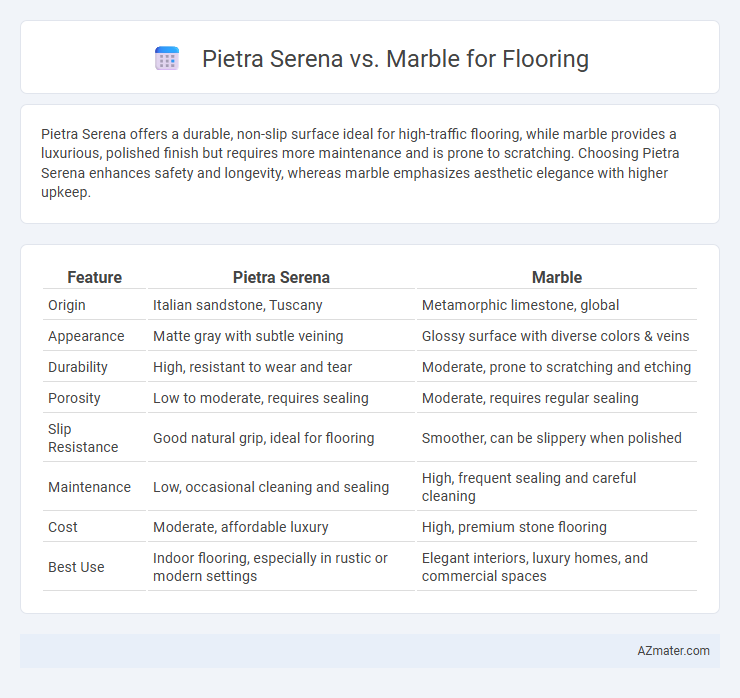Pietra Serena offers a durable, non-slip surface ideal for high-traffic flooring, while marble provides a luxurious, polished finish but requires more maintenance and is prone to scratching. Choosing Pietra Serena enhances safety and longevity, whereas marble emphasizes aesthetic elegance with higher upkeep.
Table of Comparison
| Feature | Pietra Serena | Marble |
|---|---|---|
| Origin | Italian sandstone, Tuscany | Metamorphic limestone, global |
| Appearance | Matte gray with subtle veining | Glossy surface with diverse colors & veins |
| Durability | High, resistant to wear and tear | Moderate, prone to scratching and etching |
| Porosity | Low to moderate, requires sealing | Moderate, requires regular sealing |
| Slip Resistance | Good natural grip, ideal for flooring | Smoother, can be slippery when polished |
| Maintenance | Low, occasional cleaning and sealing | High, frequent sealing and careful cleaning |
| Cost | Moderate, affordable luxury | High, premium stone flooring |
| Best Use | Indoor flooring, especially in rustic or modern settings | Elegant interiors, luxury homes, and commercial spaces |
Introduction to Pietra Serena and Marble Flooring
Pietra Serena is a dense, blue-gray sandstone renowned for its durability and unique veining, making it a popular choice for flooring in Tuscan architecture. Marble, composed primarily of calcite, is prized for its elegant, polished surface and wide range of colors, offering a luxurious aesthetic for interior floors. Both materials provide distinct textures and visual appeal, with Pietra Serena favoring a matte, rustic look, while marble delivers a glossy, refined finish.
Aesthetic Differences: Pietra Serena vs Marble
Pietra Serena offers a muted, matte finish with soft gray tones and subtle veining, creating a calm and understated elegance ideal for modern and minimalist interiors. Marble, known for its polished, glossy surface, features bold and varied veining patterns in a wide range of colors, adding a luxurious and dramatic visual impact to flooring. The aesthetic distinction lies in Pietra Serena's earthy, natural texture versus marble's classic, opulent appeal, influencing the overall ambiance and style of interior spaces.
Durability and Strength Comparison
Pietra Serena, a dense Tuscan sandstone, offers excellent durability and high compressive strength, making it resistant to wear and suitable for heavy foot traffic in flooring applications. Marble, while visually striking and available in various colors, tends to be softer and more prone to scratches and etching, which may affect its long-term durability. For flooring demanding robust strength and resistance to abrasion, Pietra Serena generally outperforms marble in maintaining structural integrity and surface quality.
Maintenance Demands of Each Material
Pietra Serena requires minimal maintenance, benefiting from its dense structure that resists stains and scratches, making it ideal for high-traffic flooring areas. Marble demands more frequent sealing and careful cleaning to prevent etching and discoloration caused by acidic substances and heavy wear. Regular upkeep of marble includes using pH-neutral cleaners and polishing to maintain its glossy finish, whereas Pietra Serena's matte surface hides imperfections and requires only basic cleaning.
Cost Analysis: Pietra Serena vs Marble
Pietra Serena flooring typically costs between $10 to $25 per square foot, providing an affordable option compared to marble, which ranges from $40 to $100 per square foot depending on the variety and quality. Installation expenses for Pietra Serena are generally lower due to its relative softness and ease of cutting, while marble requires specialized labor, increasing overall costs. Maintenance costs for Pietra Serena remain moderate, whereas marble demands frequent sealing and polishing, adding to long-term expenses.
Environmental Impact and Sustainability
Pietra Serena, a dense sandstone quarried primarily in Tuscany, offers a lower environmental impact due to its regional availability and reduced transportation emissions compared to marble, which often requires international shipping. This material's extraction involves less energy-intensive processes, resulting in lower carbon footprints while maintaining durability and aesthetic appeal. Marble, despite its elegance, generally demands more energy for quarrying and finishing, and its mining can lead to significant habitat disruption, making Pietra Serena a more sustainable choice for eco-conscious flooring projects.
Slip Resistance and Safety Features
Pietra Serena offers superior slip resistance compared to marble due to its naturally textured surface, making it a safer option for high-traffic and wet areas. Marble, although elegant, tends to become slippery when polished or wet, increasing the risk of slips and falls. Choosing Pietra Serena for flooring enhances safety without compromising aesthetic appeal, particularly in commercial and residential spaces where slip hazards are a concern.
Applications and Design Versatility
Pietra Serena offers exceptional durability and a matte, gray-blue hue that complements contemporary and rustic flooring designs, making it ideal for high-traffic residential and commercial spaces. Marble provides a polished, luxurious appearance with its wide range of colors and veining patterns, suited for elegant, classic, or modern interiors requiring a sophisticated, reflective surface. Both materials allow for cutting into various shapes and sizes, but Pietra Serena's uniform texture promotes easier maintenance, whereas marble's versatility supports creative mosaic and inlay designs for unique flooring aesthetics.
Longevity and Aging Characteristics
Pietra Serena exhibits remarkable longevity due to its dense, fine-grained structure, making it highly resistant to wear and chipping compared to marble. Unlike marble, which can develop etching and surface damage over time due to its calcite content, Pietra Serena ages with a natural patina that enhances its aesthetic appeal without compromising durability. Its low porosity also reduces susceptibility to staining and weathering, ensuring sustained performance in flooring applications.
Which Flooring Material Should You Choose?
Pietra Serena offers a durable, matte finish with natural gray tones ideal for elegant, rustic flooring, while marble provides a polished, luxurious look with unique veining patterns but requires more maintenance due to its porous nature. For high-traffic areas, Pietra Serena's resistance to wear and staining makes it a practical choice compared to marble's susceptibility to scratches and etching. Selecting between Pietra Serena and marble flooring depends on balancing aesthetic preference, durability needs, and maintenance commitment.

Infographic: Pietra Serena vs Marble for Flooring
 azmater.com
azmater.com